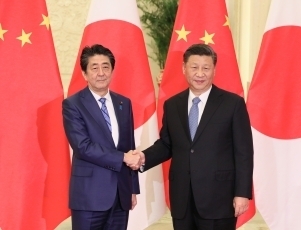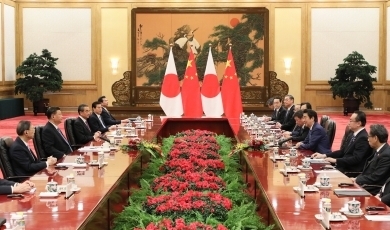Japan-China Relations
Japan-China Summit Meeting and Dinner
December 23, 2019
 Japan-China Summit Meeting and Dinner1
Photo: Cabinet Public Relations Office
Japan-China Summit Meeting and Dinner1
Photo: Cabinet Public Relations Office
 Japan-China Summit Meeting and Dinner2
Photo: Cabinet Public Relations Office
Japan-China Summit Meeting and Dinner2
Photo: Cabinet Public Relations Office
Mr. Shinzo Abe, Prime Minister of Japan, who is visiting the People’s Republic of China to attend the Japan-China-ROK Trilateral Summit Meeting, held a summit meeting with H.E. Mr. Xi Jinping, President of China, in Beijing on December 23, commencing at around 5 p.m. local time (around 6 p.m. JST) for approximately 45 minutes (simultaneous interpretation) as well as dinner, commencing at around 6 pm (around 7 p.m. JST) for approximately 1 hour and 10 minutes (consecutive interpretation), respectively. The overview of the meeting and dinner is as follows.
1 Opening Remarks
(1) The overview of President Xi’s opening remarks is as follows.
- I am pleased you are attending the eighth Japan-China-ROK Trilateral Summit Meeting. This year, Japan-China relations made continuous strides through the efforts of both countries.
- At our meeting on the margins of the G20 Summit in Osaka in June, we shared the views to build Japan-China relations appropriate for a new era and that we will together pave open a new future for the two countries. Based on this shared awareness, we shall continuously strengthen the relationship. I hope Japan and China will pave open a new future, with political traction gaining through bilateral communication.
- This year marks the 20th anniversary of Japan-China-ROK cooperation. I will strive to raise the level of cooperation and advance new cooperation for the prosperity and development of not only East Asia but also the rest of the world.
(2) The overview of Prime Minister Abe’s response is as follows.
- I am glad we can meet again following our last meeting in Osaka in June of this year. It is highly valuable that reciprocal visits have been steadily conducted at the high level, including the summit level.
- As I promised in October of last year, this time I am visiting China following your visit to Japan in June. I would like to express my appreciation for the warm welcome extended to me by President Xi and the people of China. I feel that understanding of each other has deepened through our series of discussions.
- I attach extreme importance to your State Visit to Japan next spring, which will mark an important milestone in Japan-China relations. Preparations will be made in cooperation with each other to ensure that your State Visit to Japan is meaningful and to build up a bilateral relationship that is suitable for the “new era of Japan-China relations.”
- On that occasion, I hope we ourselves can elevate the Japan-China relationship to the next stage, and send out a clear message domestically and internationally regarding both countries’ intention to fully fulfill our significant responsibility toward peace, stability, and prosperity of the region and the world. Today, I look forward to once again holding candid discussions with you from a broad perspective.
- I intend to contribute to the upcoming Japan-China-ROK Trilateral Summit Meeting, which marks its 20th anniversary and is chaired by China, so that it results in future-oriented and forward-looking outcomes and paves the way for trilateral cooperation.
2 Overview of Japan-China Relations
(1) The two leaders shared the view on continuing to work together to ensure a smooth and meaningful State Visit to Japan by President Xi next spring.
(2) Prime Minister Abe stated that Japan and China have a significant responsibility toward peace, stability, and prosperity of the region and the world, and expressed his desire to send out a clear message domestically and internationally of their intention to fulfill this responsibility. In addition, Prime Minister Abe wished that the two countries can demonstrate their determination to continue “ceaseless exchanges,” based on the need to strengthen and firmly establish reciprocal visits and dialogues at the high level, ensuring that the current momentum for improving and deepening Japan-China relations is not temporary.
3 Maritime Security Cooperation
(1) Based on the view that “there will be no genuine improvement in Japan-China relations without stability in the East China Sea,” Prime Minister Abe strongly requested China’s positive responses to the East China Sea issue, including waters surrounding the Senkaku Islands.
(2) In order to make the East China Sea a “Sea of Peace, Cooperation and Friendship,” the two sides confirmed that they will advance maritime security initiatives, including concrete initiatives under the Maritime and Aerial Communication Mechanism between defense authorities and the Japan-China Maritime Search and Rescue (SAR) Agreement and promotion of exchanges between defense and maritime law enforcement agencies.
4 People-and-People and Cultural Exchanges
(1) The two sides also welcomed the successful holding of the inaugural Japan-China High-Level People-to-People and Cultural Exchange Dialogue in November. The two sides shared the view on making next year the “Japan-China Culture and Sports Exchange Promotion Year,” and confirmed that tangible opportunities for exchanges will be established through next year’s Summer Games in Tokyo and the Winter Games in Beijing in 2022.
(2) The two sides welcomed the active tourism exchanges between Japan and China, and shared the view on further encouraging reciprocal visits between the people of both countries, including expanding their aviation relationship.
5 Economic and Practical Cooperation
(1) The two sides shared the view on further strengthening cooperation in a variety of areas, including economic and practical cooperation between Japan and China. Prime Minister Abe expressed his desire for both countries to make efforts to realize an environment for equitable competition and develop a free and fair trading system.
(2) Prime Minister Abe strongly requested China’s forward-looking response for its early removal of import restrictions on Japanese food products, expanding rice exports, and resuming beef exports. With regard to beef, Prime Minister Abe appreciated China’s announcement on December 19 regarding removal of an import ban, noting that it is a positive measure, and expressed his intention to further accelerate coordination between their authorities for the swift resumption of exports to China.
6 Case of Detainment of Japanese Nationals
Prime Minister Abe continued to strongly requested China to take swift responses to the case of detainment of Japanese nationals.
7 Matters of Concern to the International Community
(1) Regarding the situation in Hong Kong, Prime Minister Abe expressed deep concerns and stated that the international community is following the situation with interest. Prime Minister Abe sought the exercise of self-restraint by all parties concerned in addressing the matter and the swift settlement of the situation. Prime Minister Abe also conveyed the importance of the continued prosperity of a free and open Hong Kong under “one country, two systems.”
(2) Prime Minister also Abe stated that, in regard to the two countries’ contributing to the regional and international communities, importance is attached to universal values, such as freedom, respect for human rights, and the rule of law. Prime Minister Abe requested the Government of China to provide a transparent explanation of the human rights situation in the Xinjiang Uygur Autonomous Region, which is drawing increasing interest from the international community.
8 North Korean Affairs
The two sides exchanged views regarding North Korean affairs, including the recent situations. Prime Minister Abe noted the importance of North Korea’s exercise of self-restraint from further provocations. The two sides then shared the view on the importance of coordinating toward the denuclearization of the Korean Peninsula, a goal shared by Japan and China, and of fully implementing United Nations Security Council resolutions. Furthermore, Prime Minister Abe sought China’s support for the early resolution of the abductions issue.
9 South China Sea
Regarding the South China Sea issue, which is a concern shared by the international community, Prime Minister Abe noted the importance of demilitarization of disputed features and the formulation of a Code of Conduct (COC) in line with the United Nations Convention on the Law of the Sea (UNCLOS).
10 U.S.-China Relations
(1) In view of the current U.S.-China relationship, the two sides exchanged views regarding relations with the United States. Prime Minister Abe praised the recent announcement of a “Phase One agreement” by the Governments of the United States and China as a positive development, and noted the importance of resolving issues constructively through U.S.-China dialogue.
(2) Prime Minister Abe also expressed his expectation that the United States and China will continue to hold frank discussions and deepen mutual trust. In addition, Prime Minister Abe noted the importance of further reforms and opening-up by China and its realization of a fair and equitable business environment.

